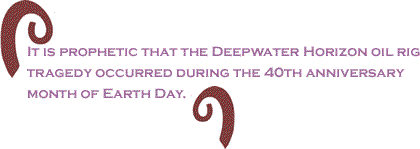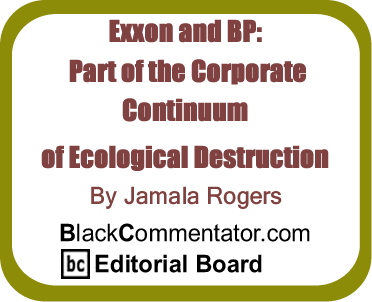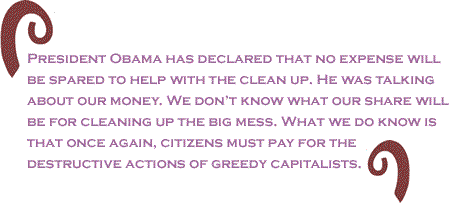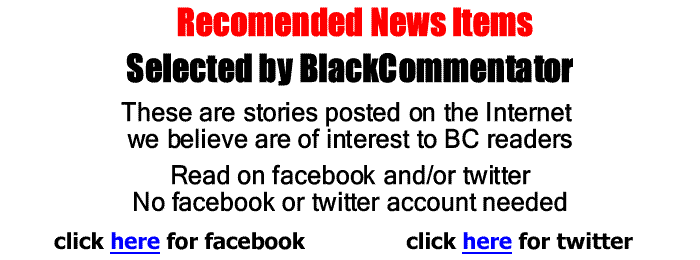
|
||||||||||||||||||||||
|
||
 |
||
Share | |
||
 |
||
As I flew into New Orleans last week, I felt like the ghosts of the Exxon Valdez environmental disaster were floating around the Gulf Coast. EV is one of the countryís largest oil spills yet most of us have vague memories of the 1989 man-made catastropheóexcept the victimized citizens and 1300 miles coastline of Alaska. That disaster resulted in 11 million gallons of crude oil seeping into the Alaskan waters, killing wildlife and a way of life. The cost of the clean up was about $2.1 billion while the impact on living things was incalculable and perpetual.† The spill affected more than fish and fowl according to Stan Jones, spokesman for the Prince William Sound Regional Citizens' Advisory Council. "The community exhibited every kind of social stress you can imagine," he said. Suicides, domestic violence, bankruptcies, drug abuse abounded in coastal towns. People still suffer from medical problems and premature deaths stemming from the lethal oil spill. Things were never the same. Expect a similar response from the Gulf. It is prophetic that the Deepwater Horizon oil rig tragedy occurred during the 40th anniversary month of Earth Day. The deaths of eleven workers were eclipsed by the 200,000+ gallons of oil gushing into the Gulf of Mexico every day since April 20. BP has been hit with about 5000 claims for damages and says that it is spending about $17 million per day in clean up costs. Thatís pittance when you look at the companyís daily profit of $93 million in the first quarter of this year. President Obama has declared that no expense will be spared to help with the clean up. He was talking about our money. We donít know what our share will be for cleaning up the big mess. What we do know is that once again, citizens must pay for the destructive actions of greedy capitalists. As with the Exxon Valdez spill, the Deepwater Horizon spill threatens all kinds of species both animal and plant and jeopardizes all the livelihoods that are dependent upon healthy and vibrant waters. BP had given the public assurances that the required safety mechanisms were in place should a malfunction happen. Now we have to watch BP, Transocean Ltd. and Halliburton play their blame game on Capitol Hill. These characters are slicker than the oil they are pumping out of the ground. The Exxon Valdez, the BP and the couple of dozen spills in between are not just about spills and drills. If there was any doubt that the oil industry can and will do the right thing, the BP disaster obliterated that notion. Environmentalists have it right: it is too dirty and too dangerous. Further, the companies have shown that canít be trusted with the truth let alone human lives and ecosystems. The Exxon Valdez and BP debacles highlight an industry more concerned about profit than progeny. In both cases, company officials lied about the initial level of catastrophe which delayed the immediate action needed to contain the damage. The industry spends millions trying to buy off people whether they are victims of their greed and recklessness or our governmental officials. According to the Center for Responsive Politics, the oil barons spent nearly $170 million in 2009 to lobby our lawmakers. BPís share of that was about $16 million.
The Department of Interior is supposed to the Peopleís Watch Dog. During the Bush Junior Administration, the DOI partied down. They were in bed with the very industry that they were supposed to be keeping in check. No, I mean they were literally in bed with the industry. According to the report by the US Inspector General, violations ranged from financial shenanigans to illegal gifts from the enemy to drug and sex orgies. The departmentís inspector general called it ďa culture of ethical failure.Ē That was putting it lightly. At
the heart of the scandal was the Mineral Management Service (MMS)
which is supposed to collect about $10 billion in royalties annually
for contracts that allow oil companies to drill around our country.†
MMS is one of the governmentís My hope is that we look at our energy problem in a holistic and comprehensive way. Itís not solely about alternative energy sources; itís about a collective lifestyle change; itís about green policies on a global scale; itís about enforcing regulations and creating new ones that address evolving issues; and itís about the accountability of corporations to the planet. Finally, itís about developing a humane and sustainable society that supports life for generations to come. BlackCommentator.com Editorial Board member Jamala Rogers is Leader of the Organization for Black Struggle in St. Louis and the Black Radical Congress National Organizer. Click here to contact Ms. Rogers. |
||
Share | |
||
 |
||
If you would like to comment on this article, please do so below. There is a 400 character limit. You do not need a FaceBook account. Your comment will be posted here on BC instantly. Thanks. Entering your email address is not mandatory. You may also choose to enter only your first name and your location.
|
||
Thank you very much for your readership. |
||
| Any BlackCommentator.com article may be re-printed so long as it is re-printed in its entirety and full credit given to the author and www.BlackCommentator.com. If the re-print is on the Internet we additionally request a link back to the original piece on our Website. | ||
| |
||
May 20, 2010 |
| Executive Editor: David A. Love, JD |
| Managing Editor: Nancy Littlefield |
| Publisher: Peter Gamble |
| Est. April 5, 2002 |
| Printer Friendly Version in resizeable plain text format |
 |
 |
 |

|
 |
| |
| |














































